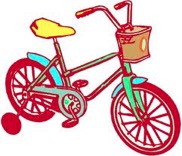Training Wheels

Learning to ride a bicycle might be the perfect training for life. It teaches the same lesson we each encounter when learning to walk, but were too small to retain. Both teach the clear distinction between balance and balancing, which might be trying to impart some acknowledgement of the much more significant difference between being and becoming.
We ask our children just what we were asked as children: “What do you want to be when you grow up?” Well-intended but none-the-less insidious, our question begs an unfortunate response. They’ll have to choose. They’ll aspire, then, to a notional state their earliest life lesson might have clearly demonstrated couldn’t exist.
At sixty, I’ve almost discarded the notion that I might be something when I finally grow up. I’m still wondering when my growing might slow enough that I might reasonably declare myself grown. But then I consider what might follow this curious achievement.
Our language betrays us. It claims absolute impossibility as if it were natural fact. It insists that we know when we are more probably learning, recalling, and integrating. We live life like verbs and describe it as if it were nouns. We say we walk when we are walking. We say we ride a bike when we are actually bicycling, endlessly balancing. We claim to be when never more than becoming.
Life’s choices take on a misleading gravitas. Many qualify as false choices, begging selection which, once chosen, leave us dead-ended, feeling as if we have no further choices. These we label ‘fateful.’
Tween-aged girls confront the, excuse the expression, mother of all fateful false choices. I don’t believe that young boys face any choice even approaching the impact of this one: “will you ‘be’ beautiful or smart?” This question high-centers many and sidetracks most for a time. Answering seems so very necessary, as if all future life depended upon it. It might. But not as posed.
This false choice ignores an infinite number of possibilities between and around the one or the other. One could choose both. Or neither. Choosing either/or won’t finish the game, but might well stall it.
Such choices serve as training wheels, perhaps, reassuring us that we can achieve balance until we learn that we will never be more than balancing here.


